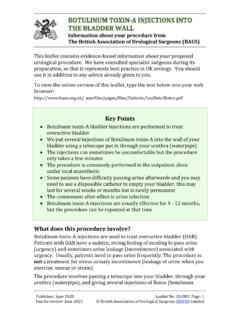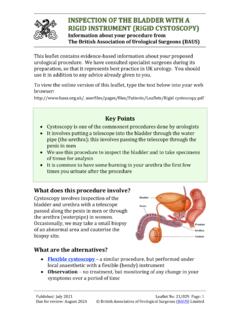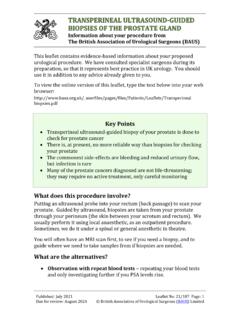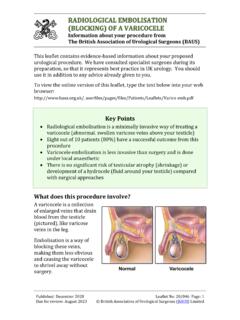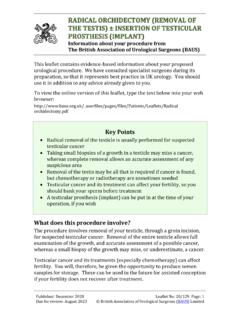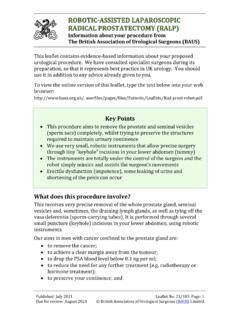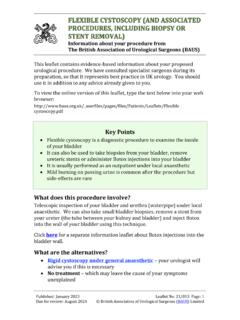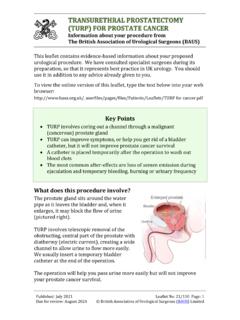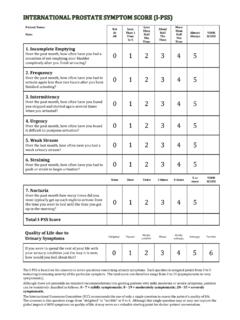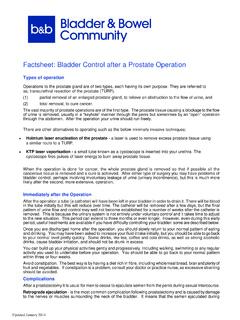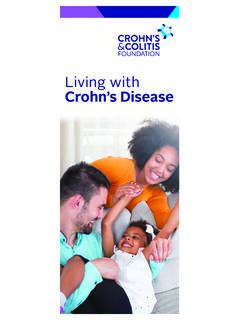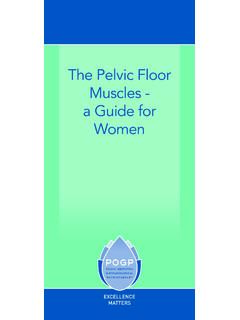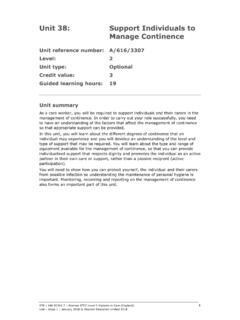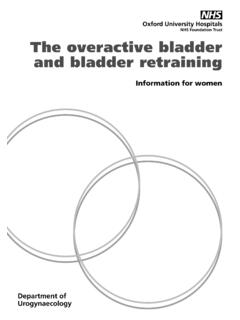Transcription of What are lower urinary tract symptoms? - BAUS
1 Information about your condition from The British Association of Urological Surgeons (BAUS) Published: July 2021 Leaflet No: 21/097 Page: 1 Due for review: August 2024 British Association of Urological Surgeons (BAUS) Limited You have been given this leaflet because you have been diagnosed with lower urinary tract symptoms which are usually caused by enlargement of your prostate gland. The aim of the leaflet is to explain the condition and to provide you with advice on things you can do to help yourself. We have consulted specialist surgeons during its preparation, so it represents best practice in UK urology. You should use it in addition to any advice already given to you.
2 To view the online version of this leaflet, type the text below into your web browser: Further information and a video about male lower urinary tract symptoms are available on the BAUS website. What are lower urinary tract symptoms? lower urinary tract symptoms (LUTS) include: frequency the need to pass urine very often; urgency the need to pass urine without much warning; urge incontinence urgency resulting in leakage of urine which you cannot control; hesitancy not being able to pass urine immediately; poor flow a decrease in the force of your urinary stream; and nocturia the need to pass urine frequently at night.
3 Going to the toilet more than six to eight times in 24 hours, with more than one of these visits occurring at night, is considered abnormal. Some patients can also get: stress incontinence leakage of urine during physical activity, coughing, sneezing or straining; and post-micturition dribble urine leakage on walking away from the toilet . Published: July 2021 Leaflet No: 21/097 Page: 2 Due for review: August 2024 British Association of Urological Surgeons (BAUS) Limited How does the bladder normally work? your kidneys filter blood continuously and produce urine which is stored in your bladder . The bladder has two main functions: it stores urine until you are able to go to the toilet; and it expels urine when you are ready to do so.
4 your bladder will normally hold 300 to 500 ml before you feel the urge to pass urine. After you feel this urge, you can still hold more, giving you time to reach the toilet. When you are ready to pass urine, you can relax your pelvic floor and contract your bladder to push the urine out. Any of these stages can be affected by LUTS. At the bottom of the bladder , your prostate gland sits around your urethra (waterpipe). As you get older, most typically after the age of 50), it is common for your prostate gland to enlarge and, as it does, it may partially block the urethra, giving rise to LUTS. If you have any of the symptoms above, you should talk to your your GP, so that he/she can discuss your symptoms, examine your prostate and suggest treatment if needed.
5 your chance of getting LUTS increases with age, as shown in this graph: What should I be drinking? A daily fluid intake of to 2 litres is recommended; this is equivalent to between five and seven mugs of liquid. You can drink tea, coffee & alcohol in moderation, but most of your fluid intake should be water or squash. Caffeine can act as a bladder irritant. If you have symptoms of frequency and urgency, you should try caffeine-free products. Drink water or fruit squash instead of caffeinated drinks such as tea, coffee, chocolate, some Published: July 2021 Leaflet No: 21/097 Page: 3 Due for review: August 2024 British Association of Urological Surgeons (BAUS) Limited energy drinks or cocoa).
6 You should reduce your caffeine intake gradually (over a fortnight or so) to prevent withdrawal symptoms. Large volumes of fluid over a short time, especially fizzy drinks, can cause rapid filling of your bladder , frequency and urgency. You should space your drinks evenly throughout the day. Ideally, your urine should be a light straw colour (like champagne or white wine). Very dark or strong-smelling urine is too concentrated, and suggests you should drink more. If your urine is colourless, with no smell, you may be drinking too much. During hot weather, air travel, after exercising and during illness you need to drink more.
7 The table below indicates some drinks and foods together with the effect they may have on your bladder : Good Possible irritants Bad Water Caffeinated drinks Fizzy drinks Decaffeinated drinks Grapefruit juice Alcohol Squashes & cordials Spicy food Cranberry juice 1 Strong tea & coffee Are there any drugs that can help? Yes. your GP can prescribe tablets to help with your urgency or urge incontinence, and to treat prostate enlargement. If you take diuretics (water tablets), these make you go to the toilet more often than normal and can worsen your symptoms. It is important that you carry on taking any prescribed drugs but, if you find they are causing you great difficulty, you should consult your GP.
8 Are there any habits I should adopt or avoid? You should avoid going to the toilet just in case and do not strain to empty your bladder or bowels. Good habits to adopt are: allow your bladder time to empty properly - wait a few seconds, then try to empty more; 1 Cranberry juice should be limited to 400 ml per day, and should be avoided if you have interstitial cystitis or are taking warfarin to thin your blood Published: July 2021 Leaflet No: 21/097 Page: 4 Due for review: August 2024 British Association of Urological Surgeons (BAUS) Limited do not drink before you go to bed - if you are troubled by getting up to pass urine at night; and only have a few sips of water at night - if you wake up needing a drink.
9 Can I do exercises to control my bladder symptoms? Yes, bladder training will probably help you by re-educating your bladder to hold a greater amount of urine. It is used to treat frequency, urgency and urge incontinence due to an overactive or unstable bladder . Some people with these symptoms get into the habit of passing urine just in case , and the bladder can then get used to holding smaller volumes. You must learn to control your bladder rather than allowing it to control you. When you feel the urge to pass urine, tell yourself that you are not going to go. Try to distract yourself for five to 15 minutes (use whatever method works best for you).
10 If you do this every time you want to pass urine, you should find, after a week or so, that your urgency reduces. The following week, do the same thing but now delay passing urine by a further five to 15 minutes. your bladder will gradually learn to hold more, and your symptoms will slowly improve. Be persistent and remember that your bladder , like any other muscle in the body, may need several months of re-training to reach its full potential. Do pelvic floor exercises help? Yes. If you do pelvic floor exercises, this can also help reduce your urgency. If you sit or stand still when you get the urge, this will also help you concentrate on tightening your pelvic floor muscles.
